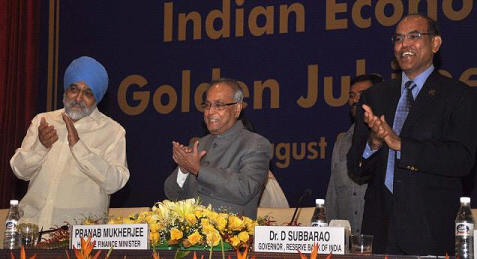Practise economics as people matter: Subbarao
by
K. R. SRIVATS

Business Line The Finance Minister, Mr Pranab
Mukherjee, flanked by the RBI Governor, Dr D. Subbarao, and the Deputy
Chairman, Planning Commission, Mr Montek Singh Ahluwalia, at the Golden
Jubilee Celebrations of the Indian Economic Service in the Capital on
Monday. – Ramesh Sharma
NEW DELHI, JULY 29:
The Reserve Bank of India (RBI) Governor, Dr D Subbarao has outlined
five principles that economists in the Government must keep in mind
while shaping economic policy.
Addressing the inaugural function of the golden jubilee celebrations of
the Indian Economic Service (IES) here, Dr Subbarao highlighted that the
global financial crisis of 2008 was in many ways a wake-up call for
economists to introspect on their profession, on their scholarship and
on their professional conduct.
The first principle, he said, that economists need to remember is to
practice economics as a people matter, which is other way of saying that
economics is not physics.
“Economists should remember that they deal with world of people.
Economics is not like physics because it deals with real world of
people, its laws are not immutable and knowledge progression in
economics is one way street”, Dr Subbarao said.
The second principle is that when economists build models, they should
fit it to the real world and not the real world to the models.
“The models that have been built by economists are dictated by
convenience and not conviction. Economists model what they can and not
what they should”.
Dr Subbarao said that macroeconomics is not aggregation of
microeconomics as models assume.
The other principles that economists would do well to remember is that
economic policy making is more than straight application of text book
knowledge, need to apply judgement, avoid group think and have a sense
of history.
“The stereotype reply from economists is that they didn’t see the crisis
coming because the world had changed.
It’s very important to have a sense of history in order not to repeat
mistakes, at least learn from them. You can never prevent another crisis
but at least you can mitigate the chances of a crisis blowing up or
indeed if a crisis were to occur you will be well equipped to handle
it”, Dr Subbarao said.
[email protected]